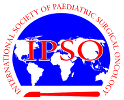The Rare Tumour Registry
IPSO maintains a rare tumour registry. If you wish to register a tumour please download a form
If you are wanting further information about rare tumours you may also be interested in the Italian ‘TREP’ project, which is shortly due to be have English language web pages
The goal of the ‘IPSO Rare Tumour Registry’ is to enhance the exchange of clinical experience between participants, to improve knowledge of epidemiological and biological aspects of rare tumours, and to provide the opportunity to exchange tumour tissue for research use. Secondarily, a broad use of the Registry will promote contact between Paediatric Surgeons interested in the field of Paediatric Surgical Oncology, and will strengthen them as a group. The ‘IPSO Rare Tumour Registry’ is not established with the goal to perform clinical trials.
General Rules
- IPSO will appoint one regular member and one member of the executive council to manage and maintain the Registry
- IPSO members should continually encourage Paediatric Surgeons to submit rare tumour cases to the Registry.
- Representatives of the Registry will give an annual rport of the cases submitted, both in the IPSO summer newsletter and at the IPSO annual meeting
- Data can only be used for publication with the approval of the surgeon(s) who submitted the specific data to the Registry
- In case of publication of the Registry data, the representatives of the Registry can, in co-operation with the President of IPSO, nominate a Paediatric Pathologist for central review of tumour material
- Relative to publications resulting from the study of patients in the Registry, the use of the name of the Society (IPSO) in the title or the text of a submitted abstract, manuscript or chapter, etc, requires the approval of the President of the Society
Data Submission
- Data should be submitted to the Registry representative with the use of the special form. This form will be available at IPSO meetings, can be ordered by the Registry representative at the Registry, or can be downloaded from the website
- All data will be anonymised, so that only the surgeon submitting the data will be able to identify the patient
- Data will be stored in a computerised database at the representatives office.
Data Retrieval & Requests
- If information is requested regarding the treatment of a rare tumour, the Registry will provide the number of similar cases in the Registry, the treatment given, and the name(s) and institution(s) of the surgeon(s) who have treated these cases.
- If information is requested regarding patient data of a specific rare tumour in order to perform a clinical or epidemiological study, or to prepare a publication, the number, but not the personal data of similar cases present in the registry will be provided, together with the name(s) and institution(s) of the surgeon(s) who have treated these cases.
- If information is requested regarding stored tissues of a specific rare tumour, the Registry will provide the name(s) and institution(s) of the surgeon(s) who has/have stored tissue of this specific rare tumour.
- Researchers receiving tumour material for laboratory investigation through information from the Registry are obliged to confirm the primary diagnosis on their own initiative.
- Any information regarding cases from the Registry will only be provided after the requesting Paediatric Surgeon has registered his/her own specific rare tumour case in the Registry.
Can any Rare Tumour be reported to the Registry?
In general, rare tumours are tumours that do not fit into an established treatment protocol. The following list should be regarded as examples. Any other rare tumour encountered, which is not mentioned in this list, is eligible for registration.
Examples
- Malignant Parotid Tumours
- Differentiated Thyroid Carcinoma
- Mammary Tumours (eg Cystosarcoma Phyloides)
- Pulmonaryblastoma
- Gastrointestinal Carcinoma
- Malignant Pancreatic Tumours
- Choledochal Carcinoma
- Ovarian Carcinoma
- Inflammatory Pseudotumour
- Amelanotic Melanoma
- Aggressive Fibromatosis
Contact Address
Daniel C Aronson, MD, PhD
Professor of Pediatric Surgery
Radboud University Nijmegen Medical Center
PO Box 9101
6500 HB Nijmegen
Netherlands
